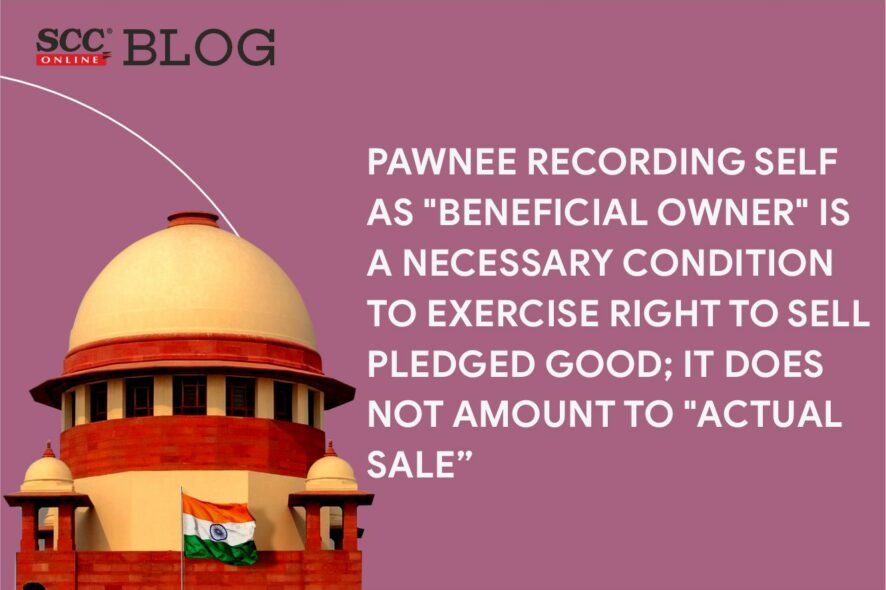Supreme Court: The bench of MR Shah and Sanjiv Khanna*, JJ has held that mere exercise of the right by the pawnee to record himself as the ‘beneficial owner’, which is a necessary precondition before the pawnee can exercise his right to sell, is not ‘actual sale’ and would not affect the rights of the pawnor of redemption under Section 177 of the Contract Act.
The Court observed,
“Every transfer or sale is not ‘actual sale’ for the purpose of Section 177 of the Contract Act. To equate ‘sale’ with ‘actual sale’ would negate the legislative intent.”
The Court was deciding the question as to whether the Depositories Act, 1996 read with the Regulation 58 of the Securities and Exchange Board of India (Depositories and Participants) Regulations, 1996 has the legal effect of overwriting the provisions relating to the contracts of pledge under the Contract Act, 1872 and the common law as applicable in India.
The Court, in a 86-pages-long verdict, explained that the Depositories Act distinguishes between the ‘registered owner’ and the ‘beneficial owner’, i.e., the de facto owner, but this does not in any manner contradict or lay down a rule which is contrary to the provisions of Sections 176 and 177 of the Contract Act. These sections, given the objective and purpose behind them, would still apply to any pledge deed and do not get diluted or overridden by the provisions or requirements of the Depositories Act. Section 10, a non obstante provision, which prevails over existing enactments by law, treats the ‘depository’ as the ‘registered owner’ and the shareholder/holder as a ‘beneficial owner’. It does not undermine or rewrite the provisions of the law of pledge and mutual obligations and rights of the pawnee and pawnor.
Further, the non-obstante part of sub-regulation (8) to Regulation 58 serves a limited objective and purpose: the pawnee must record itself as a ‘beneficial owner’ before he proceeds to sell the pledged securities. Without the pawnee being accorded the status of a ‘beneficial owner’, a pawnee cannot proceed to sell the pledged dematerialized securities. A contractual term cannot overwrite the requirement of Sections 7 and 10 of the Depositories Act, which is reflected in sub-regulation (8) to Regulation 58 as pe which the pawnee must be recorded as the ‘beneficial owner’ before the pledged dematerialized securities are sold.
“This requirement of sub-regulation (8) to Regulation 58 does not circumscribe or limit the contractual rights and obligations agreed upon between the parties on the agreed terms, including the pawnee’s right to sell the pawned goods. While the contractual terms are fundamental and determine the rights and obligations inter se the parties including when the pawnee would be entitled to get his name substituted as a ‘beneficial owner’ under the 1996 Regulations, however, the contractual terms are not permitted to override the Contract Act as explained above in so far as it regulates the rights and obligations of the pawnee and pawnor, and the requirement of compliance with Regulation 58(8).”
The Court noted that it is absolutely necessary that the pawnee must be accorded status of ‘beneficial owner’ to enable him to exercise his right to sell the pledged dematerialized securities. The object is to ensure compliance with the procedure prescribed for the sale of dematerialised securities and not to interfere with the freedom to contract as long as they comply with the Contract Act and other laws. Further, if the terms of the pledge document violate Regulation 58(8), the pledge is not rendered void or illegal, albeit enforcement of the pledge viz. the dematerialised securities will be rendered unattainable unless steps are taken to act in accordance with the procedure prescribed by the 1996 Regulations. The pawnee would be entitled to sue the pawnor for recovery of money, breach of contract and may even apply for injunction/restrain on sale of dematerialised securities. However, third-party rights on transfer of the dematerialized securities, unless injuncted by a prior court order, would not be affected as long as the transfers are in terms of the Depositories Act and the 1996 Regulations.
Stating that while interpretating the law relating to commercial matters and commerce the court must consider the real-world impact and consequences, the Court held that the expression ‘actual sale’ in Section 176 read in the context of the Depositories Act and the 1996 Regulations have to be given a meaning. The expression ‘actual sale’ used in Section 177 should be read as ‘the sale by the pawnee to a third person made in accordance with the Depositories Act and applicable by-laws and rules’. It also means and requires compliance with Section 176 of the Contract Act.
The reasoning that prior notice under Section 176 of the Contract Act would interfere with transparency and certainty in the securities market and render fatal blow to the Depositories Act and the 1996 Regulations is farfetched as it fails to notice that the right of the pawnee is to realise money on sale of the security. The objective of the pledge is not to purchase the security. Purchase by self is conversion and does not extinguish the pledge or right of the pawnor to redeem the pledge.
Hence, the Court did not find any derogation or conflict between Section 176 of the Contract Act and sub-regulations (8) and (9) of Regulation 58. Regulation 58(8) entitles the pawnee to record himself as a ‘beneficial owner’ in place of the pawnor. This does not result in an ‘actual sale’. The pawnee does not receive any money from such registration which he can adjust against the debt due. The pledge creates special rights including the right to sell the pawn to a third party and adjust the sale proceeds towards the debt in terms of Section 176 of the Contract Act.
[PTC INDIA FINANCIAL SERVICES LIMITED v. VENKATESWARLU KARI, 2022 SCC OnLine SC 608, decided on 12.05.2022]
*Judgment by: Justice Sanjiv Khanna






